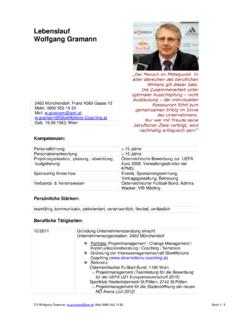Transcription of Growing Terrorism Challenge for Sports Events - Home | G4S
1 Growing Terrorism Challenge for Sports Events The issue of security at high-profile stadiums and major sporting Events has gained considerable attention in the wake of the 13 November 2015 terrorist attacks in Paris. The incident saw the Stade de France, the iconic national stadium situated in Saint-Denis, north of central Paris, targeted during a series of coordinated assaults carried out by seven terrorists linked to Islamic State (IS) in the most significant terrorist event in France's history. With France hosting the football European Championships from 10 June-10 July 2016, and Rio de Janeiro the Olympics Games in August 2016, to name but two Events , security agencies are now tasked with the increasingly complex Challenge of protecting global sporting Events from mass terrorist attacks. Key Observations Improved stadium design and security will continue to inhibit attackers from gaining access to stadiums. However, event organisers will need to remain aware of the evolving Terrorism threat and ensure mitigating strategies are in place.
2 Continued assessment and improvement of stadiums' physical security, procedures and crowd control measures will increase financial and logistical challenges for event planners and organisers. Heightened security at high-profile sporting Events will become standard procedure. Paradoxically, increased stadium security will present attractive terrorist targets as potential target locations expand into areas around the stadium where large crowds gather, particularly on approach routes and at nearby transport hubs. Corporations and individuals attending high-profile sporting Events will need to be more conscious of their own security due to the additional pressures upon public resources, taking into consideration incident management and emergency response planning. Motivations Sport is no stranger to the threat from Terrorism . High-profile Successful attacks sporting Events , including the Olympics, football tournaments and cricket matches, have been targeted, with varying degrees of impact 1996 - Centennial Olympic Park, Atlanta, US.
3 And success since the 1972 Olympics in Munich, Germany. A number bombing leaves one dead and 111 injured 2002 Karachi; Pakistan; New Zealand cricket of incidents have been prevented at high-profile sporting Events in team hotel targeted leaves 14 dead including nine recent years due to successful counter- Terrorism operations. French nationals 2009 Lahore, Pakistan; Sri Lankan cricket team The assault on the Stade de France in November 2015 illustrates the deliberately targeted by Lashkar-e-Jhangvi militants, killing six officers and injuring several increasing threat from Islamist-related Terrorism , especially IS- team members affiliated entities or sympathisers. Football tournaments are highly 2013 Boston Marathon, US; two bombs attractive targets, with non-Muslim and Muslim supporters and detonated near the finish line leave three people players alike creating a multicultural environment. This cultural and dead and more than 260 injured religious diversity is a key motivating factor for IS and such attacks Foiled plots are anticipated to continue.
4 Furthermore, the media attention generated by sporting Events is another driver. IS is critically aware 1998 FIFA World Cup, France; Police arrest of its propaganda campaign and the manipulation of social and 100 people in several countries over plan mainstream media to increase its profile. As such, the combination of targeting the Marseille stadium to kidnap players and officials in the England vs Tunisia fixture, as the Growing threat from IS, the media attention garnered by the well as the hotel used by the US team group and sporting Events , as well as the presence of a large, 2000 Euro 2000, Belgium/Netherlands;. condensed crowd of people in a restricted area, makes sport a 2004 Euro 2004, Portugal; police arrest three prominent Terrorism target. This is underpinned by what sport is Islamists planning to target former Portuguese Prime Minister Jose Manuel Barroso deemed to represent togetherness, integrity, inclusivity, among November 2015 - Germany-Netherlands football other values that IS, and other groups, diametrically oppose.
5 Match, Hanover; bomb threat led to the evacuation of the stadium _____. Issue Date: March 2016 Commercial In Confidence Page 1. For further G4S Risk Consulting analysis and advice, please contact Case Study: Stade de France Attack First explosion at 2120hrs local time The impact of the attack at the Stade de France stadium on 13 November 2015 appears to have been limited by security measures at the stadium. The first suicide bomber was frisked and discovered by a security guard at Gate J, before stepping back and detonating his device, killing himself and a bystander. The incident took place some 15 minutes into the match at around 2120hrs local time. Around three minutes later, a second person also blew himself up outside the Second explosion at stadium near Gate H. A third suicide attacker 2123hrs local time detonated explosives at a nearby McDonald's restaurant. The explosions were heard inside the stadium, but it appears many in attendance Third explosion at assumed the noise was made by fireworks, 2153hrs local time, near a McDonald's common at European football matches.
6 Restaurant Initial assessments suggested the bombers wanted to enter the stadium, potentially to target President Francois Hollande, who was at the match between France and Germany. Any detonation inside the stadium would have caused major panic. However, it is also possible that the bombers mis-timed their attacks, and knowing they would be unable to circumvent stadium security, intended instead to target crowds as they arrived or left the stadium. Had they managed to enter the venue, the impact would have been significant. The decision by officials to keep the crowd inside the stadium after the first two bombings as an invacuation measure almost certainly prevented casualties. Security is now being reviewed ahead of the Euro 2016 football tournament in 10 cities across France. For the tournament, Euro 2016. SAS, a joint venture between the FFF and UEFA, will be responsible for all operational aspects of the tournament. Jacques Lambert, the chairman of Euro 2016 SAS, says he expects stadium security to be robust, but that the risk is higher on the streets and at other spontaneous gatherings.
7 At present, the government is responsible for assuring security around stadium locations and the fan zones where matches can be watched on giant screens. Private security firms are in charge of safety inside stadiums and the French police are responsible for security outside, though law enforcement agencies as the executive authority can enter venues when required. The plans are now to be reviewed before finalisation due to threat posed by IS, with the current procedures likely to be amended for the Euro 2016. The threat against sporting Events from IS and other Islamist militant groups is set to remain a long-term concern. The 12th edition of Inspire, the al-Qaeda propaganda publication, released in March 2014, called for bomb attacks against sporting Events including the US tennis open, the UK FA Cup, the English Premier Football League and the League Cup in France. Al-Qaeda in the Arabian Peninsula (AQAP), which produces the publication, also provided advice on how to carry out attacks, suggesting the best time to target a UK football match is when the crowds are leaving the stadium.
8 IS has also threatened to target future sporting Events , as well as France in general, suggesting the 2016 European Championships is a likely target. While the causal link between extremist publications and actual attacks is questionable, it would be irresponsible to ignore the impact of such calls. The Tsarnaev bombers who targeted the Boston Marathon in 2013 used guidance from the first edition of Inspire to carry out their attacks. The threat posed by IS and its intent to target Western interests suggests the risk to sporting Events is now more significant than in previous decades. IS claimed after the 13 November attacks that France would remain a priority target, along with other Western countries involved in the anti-IS coalition conducting airstrikes in Iraq and Syria. Western Europe, including France and the UK, has reported an increasing number of foiled terrorist attacks since IS declared its so-called caliphate in June 2014. As such, securing Sports Events , particularly high-profile games such as the Olympics, the European Championships, Wimbledon and the French Open, has become more challenging and a long-term issue.
9 _____. Issue Date: March 2016 Commercial In Confidence Page 2. For further G4S Risk Consulting analysis and advice, please contact Impact of Paris terrorist attack The 13 November attacks on the Stade de France triggered a major response by Sports organisers. In the following weeks, Events across France were postponed, including football league matches and European rugby fixtures. For the Six Nations Rugby Championship match at Stade de France on 6 February, French Rugby Federation (FRF) officials implemented the largest security operation ever seen at a Sports event in the country. A robust search regime was introduced, involving some 250. police officers and 900 security staff almost double the number from previous years. Specialist teams using dogs and snipers were also deployed. The security perimeter was extended to 100m away from the stadium, with attendees searched at least twice before being allowed to enter. Public transport and routes to the stadium were also under heavy surveillance.
10 Attendees were asked to arrive early, with the stadium opening two hours before kick-off to minimise congestion. The threat has also been felt beyond Europe, with the security operation for the Super Bowl 50 on 7 February in San Francisco involving 4,000 personnel. Counter- Terrorism planning for the event had taken three years to formalise, but was reviewed in light of the Paris attacks. Moreover, organisers of football matches in Australia have also committed to improving security in 2016 following advice and consultation with French officials after the 13 November attacks. Sporting Events organisers/security managers in Japan, Spain and Trinidad also escalated security. Attention is turning to the Summer Olympic and Paralympic Games in Rio de Janeiro, Brazil, in August and September 2016, with the current security budget estimated at some USD 195 million, significantly less than other previous games; London in 2012 (USD 870 million), Athens in 2004 (USD billion), Vancouver in 2010 (USD 1 billion) and Sochi, in 2014 (USD 3.)




